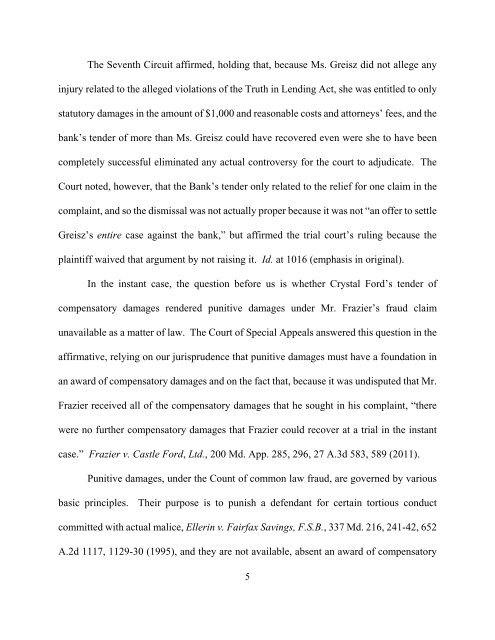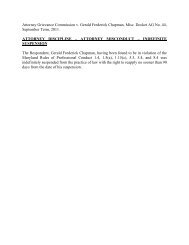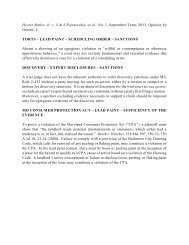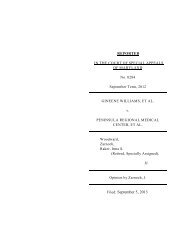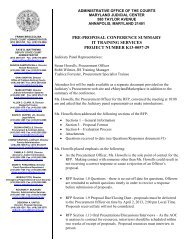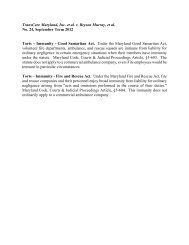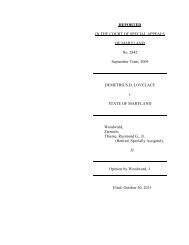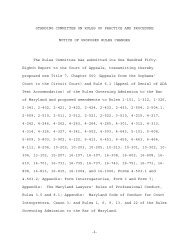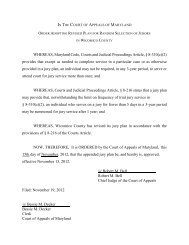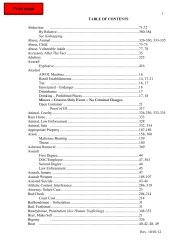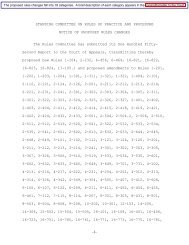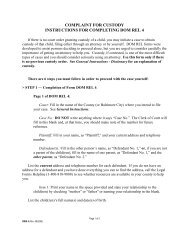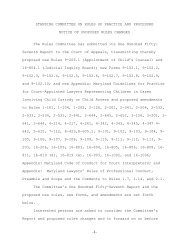Anthony M. Frazier v. Castle Ford, Ltd., f/k/a ... - Maryland Courts
Anthony M. Frazier v. Castle Ford, Ltd., f/k/a ... - Maryland Courts
Anthony M. Frazier v. Castle Ford, Ltd., f/k/a ... - Maryland Courts
Create successful ePaper yourself
Turn your PDF publications into a flip-book with our unique Google optimized e-Paper software.
The Seventh Circuit affirmed, holding that, because Ms. Greisz did not allege any<br />
injury related to the alleged violations of the Truth in Lending Act, she was entitled to only<br />
statutory damages in the amount of $1,000 and reasonable costs and attorneys’ fees, and the<br />
bank’s tender of more than Ms. Greisz could have recovered even were she to have been<br />
completely successful eliminated any actual controversy for the court to adjudicate. The<br />
Court noted, however, that the Bank’s tender only related to the relief for one claim in the<br />
complaint, and so the dismissal was not actually proper because it was not “an offer to settle<br />
Greisz’s entire case against the bank,” but affirmed the trial court’s ruling because the<br />
plaintiff waived that argument by not raising it. Id. at 1016 (emphasis in original).<br />
In the instant case, the question before us is whether Crystal <strong>Ford</strong>’s tender of<br />
compensatory damages rendered punitive damages under Mr. <strong>Frazier</strong>’s fraud claim<br />
unavailable as a matter of law. The Court of Special Appeals answered this question in the<br />
affirmative, relying on our jurisprudence that punitive damages must have a foundation in<br />
an award of compensatory damages and on the fact that, because it was undisputed that Mr.<br />
<strong>Frazier</strong> received all of the compensatory damages that he sought in his complaint, “there<br />
were no further compensatory damages that <strong>Frazier</strong> could recover at a trial in the instant<br />
case.” <strong>Frazier</strong> v. <strong>Castle</strong> <strong>Ford</strong>, <strong>Ltd</strong>., 200 Md. App. 285, 296, 27 A.3d 583, 589 (2011).<br />
Punitive damages, under the Count of common law fraud, are governed by various<br />
basic principles. Their purpose is to punish a defendant for certain tortious conduct<br />
committed with actual malice, Ellerin v. Fairfax Savings, F.S.B., 337 Md. 216, 241-42, 652<br />
A.2d 1117, 1129-30 (1995), and they are not available, absent an award of compensatory<br />
5


